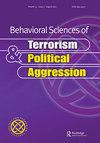证明的压力:穆斯林皈依者的激进主义和激进主义由宗教斗争和惩罚安拉重新评估介导
IF 1.4
Q2 POLITICAL SCIENCE
Behavioral Sciences of Terrorism and Political Aggression
Pub Date : 2020-09-02
DOI:10.1080/19434472.2020.1800788
引用次数: 3
摘要
与未皈依的穆斯林相比,穆斯林在伊斯兰恐怖主义中所占比例过高——为什么?为了探索可能的解释,我们在相关人群中探讨了激进主义和伊斯兰宗教信仰的各个方面。具体来说,我们用激进主义和激进主义意向量表(ARIS: Moskalenko & McCauley[2009])调查了356名美国成年穆斯林,其中177人是自我认定的皈依者。衡量政治动员:激进主义与激进主义的区别。恐怖主义与政治暴力,21(2),239-260。https://doi.org/10.1080/09546550902765508)和伊斯兰宗教信仰的心理测量(PMIR: Abu Raiya et al.[2008])。伊斯兰教宗教性的心理测量:可靠性和有效性的发展和证据。国际宗教心理学杂志,18(4),291-315。https://doi.org/10.1080/10508610802229270)。我们使用ARIS是因为恐怖主义是罕见的,但激进主义和激进主义更常见。激进主义和激进主义参与可能与恐怖主义参与相关,尽管它们既不是必要的先决条件,也不是充分的先决条件。我们发现,与非皈依者相比,皈依者在ARIS上表现出更高的参与激进主义和激进主义的意图,他们在PMIR上经历了更大的宗教斗争和更低的惩罚真主重新评估的恐惧(PAR)。我们还发现,这两个PMIR因素都部分地介导了皈依与激进主义/激进主义之间的关系。我们认为,这是因为皈依者感到证明自己信仰的压力,尤其是当他们相信真主会惩罚不忠的时候。我们结合当前的心理学和政治动员文献对这些发现进行了讨论,并对未来关于皈依、激进主义和宗教体验之间关系的研究提出了建议。本文章由计算机程序翻译,如有差异,请以英文原文为准。
Pressure to prove: Muslim converts’ activism and radicalism mediated by religious struggle and punishing Allah reappraisal
ABSTRACT Muslim converts are overrepresented in Islamist terrorism compared to non-convert Muslims – Why? To explore possible explanations, we probed aspects of radicalism and Islamic religiousness within relevant populations. Specifically, we surveyed 356 American Muslim adults, of which 177 were self-identified converts, with the Activism and Radicalism Intention Scale (ARIS: Moskalenko & McCauley [2009]. Measuring political mobilization: The distinction between activism and radicalism. Terrorism and Political Violence, 21(2), 239–260. https://doi.org/10.1080/09546550902765508) and the Psychological Measure of Islamic Religiousness (PMIR: Abu Raiya et al. [2008]. A psychological measure of Islamic religiousness: Development and evidence for reliability and validity. The International Journal for the Psychology of Religion, 18(4), 291–315. https://doi.org/10.1080/10508610802229270). We used the ARIS because terrorism is rare, but radicalism and activism are more common. Activism and radicalism engagement may correlate with terrorism engagement, though they are neither necessary nor sufficient antecedents. We found that converts, compared to non-converts, demonstrated higher intent to engage in activism and radicalism on the ARIS, and that they experienced greater Religious Struggle and lower Fear of Punishing Allah Reappraisal (PAR) on the PMIR. We also found that both of these PMIR factors partially mediated the relationships between conversion and activism/radicalism. We propose that this is because converts feel a pressure to prove their faith, especially when they believe Allah punishes unfaithfulness. We discuss these findings in light of current psychology and political mobilization literature and then offer suggestions for future research on the relationships between conversion, radicalism, and religious experiences.
求助全文
通过发布文献求助,成功后即可免费获取论文全文。
去求助
来源期刊

Behavioral Sciences of Terrorism and Political Aggression
POLITICAL SCIENCE-
CiteScore
4.80
自引率
10.00%
发文量
27
 求助内容:
求助内容: 应助结果提醒方式:
应助结果提醒方式:


